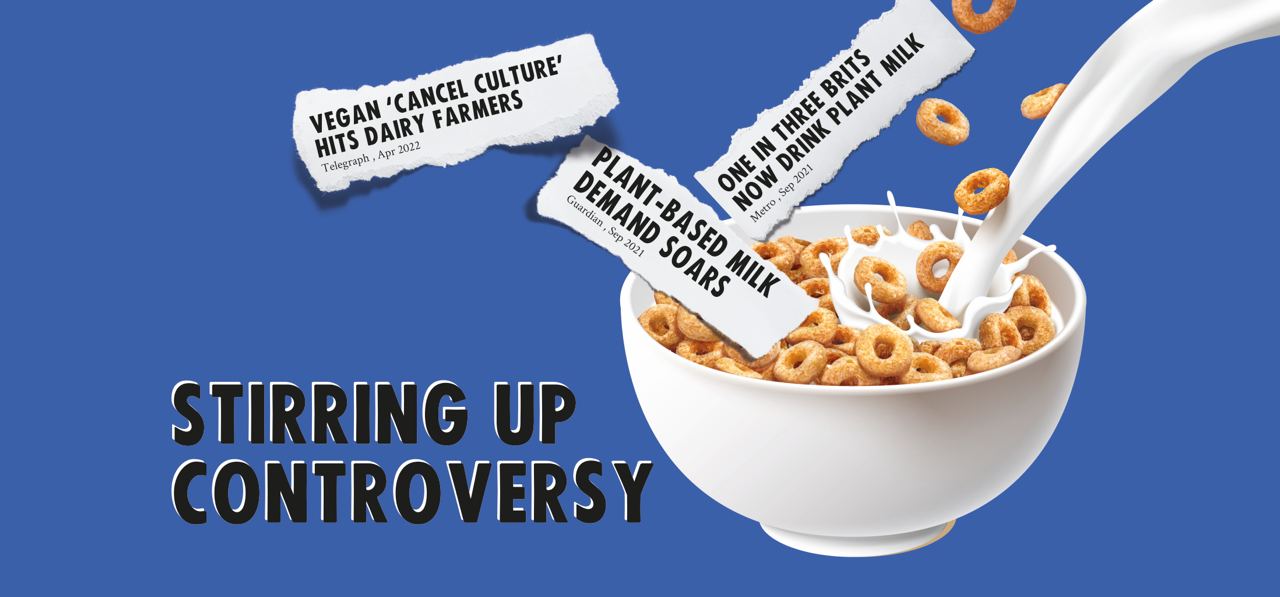No doubt about it, April was a hard month for most of us. With the cost of living crisis pricing people out of existence, the war in Ukraine causing untold suffering as well as contributing to food crises across the world and extreme weather ‘testing the limits of human survivability’ in India and Pakistan, it’s already feeling like 2022 is going to be a year of struggle and hardship. Amidst all of this, there’s one thing that is probably far from most people’s minds right now, but which is shaping up to be a power play between big business and the consumer which has the potential to reshape our entire food system. That thing is, the price of milk.
While the news is bombarded with crisis after crisis, you’d be forgiven for not noticing a small marketing campaign launched by our old friends at Arla Foods. Remember, Arla runs the biggest dairy production centre in the UK, which we shut down in August last year. Their new campaign, called ‘don’t cancel the cow,’ takes aim at consumers shifting away from milk and dairy products, calling on people to shun vegan ‘cancel culture’ which they claim is causing people to give up dairy products due to shame and ‘social pressure,’ rather than facts. The campaign launch coincided with news that due to fuel, feed and fertiliser costs increasing, caused in large part by the war in Ukraine, dairy prices are rising, with the cost of milk experiencing a surge ‘not seen in decades.’ Additionally, the ‘skyrocketing’ costs of production are causing many farmers to struggle, with some leaving the industry entirely.
Dairy = Destruction
“Considering different sources of protein, the costs of dairy to the environment are probably five to 10 times greater than plant-based protein sources.” Walter Willett, MD, DrPH. Professor of nutrition and epidemiology at the Harvard T.H. Chan School of Public Health
So let’s take stock, shall we? Rising costs lead to instability in the dairy industry. This leads to farmers struggling to make ends meet and the price of milk going up. In the meantime, consumers are shifting away from dairy as they respond to the environmental impact, ‘rising animal cruelty concerns,’ questionable health benefits and the abundance of plant-based alternatives. This puts pressure on the corporations responsible for pumping out dairy, as their entire business model relies on people buying milk.
In the world we’d like to see at Animal Rebellion, the dairy industry would take this opportunity to support farmers to transition to plant-based systems, or support them to transition out of the industry in other ways. Research shows that dairy production contributes to climate change, acidification, eutrophication, and ozone depletion (van der Werf et al., 2009; Djekic et al., 2014), and has an overall carbon footprint which is comparable to that of aviation and shipping combined (FAO, 2019; Ritchie and Roser, 2020). Additionally, a 2015 study predicted that animal-free dairy products (produced using ‘precision fermentation’) use 65% less energy, 91% less land, and 98% less water, while emitting 84% less greenhouse gases, than animal-based dairy equivalents (Steer, 2015).
Yet, instead of a just transition for the dairy industry, we are instead seeing a response from the industry which is all too familiar. In a previous blog post we looked at how the meat and dairy industry has kept itself afloat by using the same PR tactics as the tobacco and fossil fuel industries. In Arla’s recent campaign we can see them playing out again. If you remember, the formula is simple. Step 1. Cast doubt on the science through dodgy research and paid experts. Step 2. Stir up controversy to distract from the real issue and delay necessary action. Let’s take a look:
- Cast Doubt
Arla’s recent campaign is a case study in how to use PR spin to discredit science. In an article written by Arla for Metro, they slap down concerns about the impact of the dairy industry and promise to ‘bring some balance back to the board,’ for people who are ‘being swayed by Veganuary or pressured into flexitarianism.’ The article quotes a survey done by Arla which found that 28 million people in the UK feel social pressure to make “critical diet choices,” nearly half felt ashamed ordering dairy in public and 21% had cut out dairy entirely. Rather than exploring why people are so rapidly transitioning from an industry which is causing catastrophic damage to the planet and animals, Arla instead brushes off concerns, writing that there’s ‘no shame in mixing things up from time to time,’ and stressing the environmental and health benefits of dairy. To top it off, the survey mentioned is impossible to find online, meaning that there’s no way to look at the results ourselves or check out what questions they asked people.
This is a classic move by Arla in the face of a growing body of scientific evidence that dairy is not good for us or our planet. Instead of responding to the research, they create a campaign which likens moving away from dairy to ‘cancel culture’ and references vague, concerning sounding impacts of avoiding products. Similarly, Arla undermines people’s concerns by implying people are mixed up and confused, in a similar way to how the tobacco industry used ‘experts’ to reassure people that smoking was good for you and the meat industry responded to decreased profits with a PR campaign to convince people that the healthiest breakfast included bacon.
- Stir Up Controversy
In addition to casting doubt on science, destructive industries also need a distraction to draw people’s attention away from what they want to hide. With a media that thrives on scandal and conflict, these industries have to create a narrative that places them as the hero or the victim in order to gain sympathy or loyalty. Of course, to do that they need a clear villain. In the case of the meat, dairy and fishing industry, you’ll often find them placing the blame on the individuals who are trying to live in a way which is ethical, just and sustainable: vegans.
Take Arla’s campaign as an example. In a press release sharing findings from their recent survey, Arla dismisses the discovery that 41% of people saw ‘swapping animal protein for plant-based alternatives’ as an indicator of what makes a sustainable diet, brushing off what others are labelling a noticeable shift in generational social norms as a sign that “cancel culture is playing too much of an influence in the way that we make decisions relating to our diets.” Although in their own press release, Arla is careful not to put the blame on any group explicitly, the news media was quick to read between the lines, converting the dairy giant’s veiled references to the influence of ‘social media,’ and ‘social pressures’ into headlines such as ‘Dairy Giant Decries Vegan ‘Cancel Culture,’ (Gizmodo), ‘Cancel culture killing milk and cheese because people are ‘feeling ashamed towards dairy’ (GB News) and ‘Vegan ‘cancel culture’ hits dairy farmers’ (The Telegraph).
What we are seeing is growing social awareness about the need to transition to a food system that puts the climate and animals before profit and endless growth. Instead of crying ‘cancel culture’ these industries should be responding to the rapidly changing world we live in and supporting people to be able to access food which is just, sustainable and affordable. We believe that Gizmodo put it perfectly in their response to Arla’s press release when they said:
“Canceling” powerful industries by talking frankly about their environmental impacts is not a real concern.”
What we should be concerned about is powerful industries using media spin, misdirection, deceit and manufactured conflict to distract from the real issue. Our planet is on a path towards destruction and we’re running out of time to avert the worst of the impacts. One thing that Arla doesn’t talk about in their report is that their own survey results show just how possible change is. People are not only concerned about the future of the planet, they are aware of solutions they need to take and are willing to rise to the challenge. A recent study of 5,054 individuals from Brazil, Germany, India, the UK and the USA even found that, not only did the vast majority of participants view animal free dairy as more ethical and environmentally friendly, 78.8% are probably or definitely likely to try such a product, with 70.5% probably or definitely likely to buy.
The world we need to build to tackle the challenges we are facing and create a just and fair future for all life is closer than we think. Now we just need industries like the dairy industry to stop standing in the way and support a transition to a better world. If not, we won’t hesitate to take action until they do. Will you join us?
We’ve taken action at Arla before! Learn more about how we’ve challenged the dairy industry here.
Want to read more about how the meat and dairy industry manipulate the media to maintain the status quo? Check out the below articles for more information:
How Big Meat is impeding plant-based products | Corporate Knights
How Big Ag Bankrolled Regenerative Ranching
The meat industry is doing exactly what Big Oil does to fight climate action – The Washington Post

